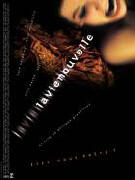Film Review: 'La Vie Nouvelle'
A visual feast but a narrative famine? That'll be the new life...
The highlight of the Cine France programme for this writer, Philippe Grandrieux's 'La Vie Nouvelle' is one of the most striking, uncompromising and innovative films of recent years. Grandrieux's long-awaited second feature arguably goes even further in its exploration of dislocation, darkness and human extremity. The setting is the Bulgarian capital, Sofia, where a young American (Zach Knighton) falls for a prostitute-stripper-chanteuse (Anna Mouglalis), and pursues her through after-hours clubs and down darkened hotel corridors where sinister thugs and the brutality and bestiality of man dominate a hellish underworld.
 'La
Vie Nouvelle' is nightmarish not just in its subject matter but in its execution
too; using extreme narrative fragmentation, a disorienting shooting style and a
claustrophobic soundtrack, Grandrieux pushes the narrative to the brink of abstraction,
leaving viewers to take their interpretation of what is actually unfolding. But
there is no such vagueness over the film's ideological aims. 'La Vie Nouvelle' powerfully
indicts humanity for its ultimate primeval savagery and its cannibalistic destiny
to devour itself. Grandrieux's film exists at the hard edge of the new European
cinema, its grim vision and techniques of dislocation rivalling the more controversial
work of Gaspar No?/a>.
'La
Vie Nouvelle' is nightmarish not just in its subject matter but in its execution
too; using extreme narrative fragmentation, a disorienting shooting style and a
claustrophobic soundtrack, Grandrieux pushes the narrative to the brink of abstraction,
leaving viewers to take their interpretation of what is actually unfolding. But
there is no such vagueness over the film's ideological aims. 'La Vie Nouvelle' powerfully
indicts humanity for its ultimate primeval savagery and its cannibalistic destiny
to devour itself. Grandrieux's film exists at the hard edge of the new European
cinema, its grim vision and techniques of dislocation rivalling the more controversial
work of Gaspar No?/a>.
'La Vie Nouvelle' is poetic in its imagery and slowness but the images that roll across the screen are peerless in their artistic merit. From the strip club scenes, set to a soundtrack of pulverising techno, to the grainy, hand held images of the silent landscapes, Grandrieux gives absolute priority to atmospheric visuals. The vast, silent landscapes give no clue to the location of the opening scene, until we encounter a group of people who are quite obviously prisoners of war or refugees. Flashes early on to anonymous, worn faces hint at something sinister, the characters filmed suggesting inmates of a concentration camp or witnesses of a terrible genocide. The ravaged landscape begins to suggest a Chechnya or a Bosnia. Viewers are prepared for something discomforting, a reproduction of recent Balkan reality perhaps, but the wide landscapes and the silence - the video installation quality to the work - rob viewers of the usual sonic suggestions of violence and the fast editing that we expect from films dealing in violence.
The dichotomy between Hollywood and European cinema appears very stark when productions like 'La Vie Nouvelle' surface. Hollywood churns out films, European filmmakers produce cinema, forcing viewer to choose between stories and art. Almodovar, the Coen brothers, Godard and Wenders have all of course managed to combine a story with terrific filmmaking craft to create great art. 'La Vie Nouvelle' survives on just enough of a story thread to qualify as a film and not solely what it certainly is, a great collection of installation art.
Narrative is the last thing on Grandieux's artistic agenda. His need is to appropriate images which will represent a state of mind. Irreversible is full of threat and menace, violence hovering almost every encounter. It's a disconcerting work, claustrophobic, primal and sexual and like Gaspar No?#39;s 'Irreversible', very reminiscent of the psychological manipulation in the twisting and writing of a Francis Bacon canvas. This is a film that rises above its discomforts and deserves to be seen for all its challenging, dazzling and contentious quality. Just as with No?#39;s 'Irreversible' and the recent German film 'Das Experiment', this film will, once viewed, be very hard to shift from your mind and conscience for some time after.
Mark Godfrey
![]() Click
here to check out a review of the the film 'Irreversible'
referred to in the article above.
Click
here to check out a review of the the film 'Irreversible'
referred to in the article above.
